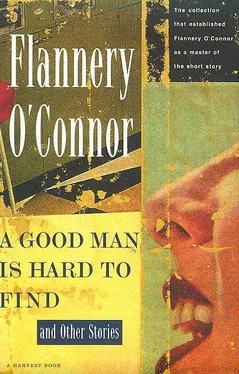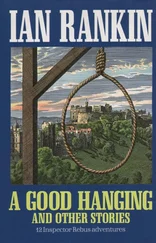He didn’t know what procession this was but there was something familiar about it. It must be familiar to him since it had come to meet him, but he didn’t like a black procession. Any procession that came to meet him, he thought irritably, ought to have floats with beautiful guls on them like the floats before the preemy. It must be something connected with history like they were always having. He had no use for any of it. What happened then wasn’t anything to a man living now and he was living now.
When all the procession had flowed into the black pool, a black figure began orating in front of it. The figure was telling something about history and the General made up his mind he wouldn’t listen, but the words kept seeping in through the little hole in his head. He heard his own name mentioned and his chair was shuttled forward roughly and the Boy Scout took a big bow. They called his name and the fat brat bowed. Goddam you, the old man tried to say, get out of my way, I can stand up!—but he was jerked back again before he could get up and take the bow. He supposed the noise they made was for him. If he was over, he didn’t intend to listen to any more of it. If it hadn’t been for the little hole in the top of his head, none of the words would have got to him. He thought of putting his finger up there into the hole to block them but the hole was a little wider than his finger and it felt as if it were getting deeper.
Another black robe had taken the place of the first one and was talking now and he heard his name mentioned again but they were not talking about him, they were still talking about history. “If we forget our past,” the speaker was saying, “we won’t remember our future and it will be as well for we won’t have one.” The General heard some of these words gradually. He had forgotten history and he didn’t intend to remember it again. He had forgotten the name and face of his wife and the names and faces of his children or even if he had a wife and children, and he had forgotten the names of places and the places themselves and what had happened at them.
He was considerably irked by the hole in his head. He had not expected to have a hole in his head at this event. It was the slow black music that had put it there and though most of the music had stopped outside, there was still a little of it in the hole, going deeper and moving around in his thoughts, letting the words he heard into the dark places of his brain. He heard the words, Chickamauga, Shiloh, Johnston, Lee, and he knew he was inspiring all these words that meant nothing to him. He wondered if he had been a general at Chickamauga or at Lee. Then he tried to see himself and the horse mounted in the middle of a float full of beautiful girls, being driven slowly through downtown Atlanta. Instead, the old words began to stir in his head as if they were trying to wrench themselves out of place and come to life.
The speaker was through with that war and had gone on to the next one and now he was approaching another and all his words, like the black procession, were vaguely familiar and irritating. There was a long finger of music in the General’s head, probing various spots that were words, letting in a little light on the words and helping them to live. The words began to come toward him and he said, Dammit! I ain’t going to have it! and he started edging backwards to get out of the way. Then he saw the figure in the black robe sit down and there was a noise and the black pool in front of him began to rumble and to flow toward him from either side to the black slow music, and he said, Stop dammit! I can’t do but one thing at a time! He couldn’t protect himself from the words and attend to the procession too and the words were coming at him fast. He felt that he was running backwards and the words were coming at him like musket fire, just escaping him but getting nearer and nearer. He turned around and began to run as fast as he could but he found himself running toward the words. He was running into a regular volley of them and meeting them with quick curses. As the music swelled toward him, the entire past opened up on him out of nowhere and he felt his body riddled in a hundred places with sharp stabs of pain and he fell down, returning a curse for every hit. He saw his wife’s narrow face looking at him critically through her round gold-rimmed glasses; he saw one of his squinting bald-headed sons; and his mother ran toward him with an anxious look; then a succession of places—Chickamauga, Shiloh, Marthasville—rushed at him as if the past were the only future now and he had to endure it. Then suddenly he saw that the black procession was almost on him. He recognized it, for it had been dogging all his days. He made such a desperate effort to see over it and find out what comes after the past that his hand clenched the sword until the blade touched bone.
The graduates were crossing the stage in a long file to receive their scrolls and shake the president’s hand. As Sally Poker, who was near the end, crossed, she glanced at the General and saw him sitting fixed and fierce, his eyes wide open, and she turned her head forward again and held it a perceptible degree higher and received her scroll. Once it was all over and she was out of the auditorium in the sun again, she located her kin and they waited together on a bench in the shade for John Wesley to wheel the old man out. That crafty scout had bumped him out the back way and rolled him at high speed down a flagstone path and was waiting now, with the corpse, in the long line at the Coca-Cola machine.
Besides the neutral expression that she wore when she was alone, Mrs. Freeman had two others, forward and reverse, that she used for all her human dealings. Her forward expression was steady and driving like the advance of a heavy truck. Her eyes never swerved to left or right but turned as the story turned as if they followed a yellow line down the center of it. She seldom used the other expression because it was not often necessary for her to retract a statement, but when she did, her face came to a complete stop, there was an almost imperceptible movement of her black eyes, during which they seemed to be receding, and then the observer would see that Mrs. Freeman, though she might stand there as real as several grain sacks thrown on top of each other, was no longer there in spirit. As for getting anything across to her when this was the case, Mrs. Hopewell had given it up. She might talk her head off. Mrs. Freeman could never be brought to admit herself wrong on any point. She would stand there and if she could be brought to Say anything, it was something like, “Well, I wouldn’t of said it was and I Wouldn’t of said it wasn’t,” or letting her gaze range over the top kitchen shelf where there was an assortment of dusty bottles, she might remark, “I see you ain’t ate many of them figs you put up last summer.”
They carried on their most important business in the kitchen at breakfast. Every morning Mrs. Hopewell got up at seven o’clock and lit her gas heater and Joy’s. Joy was her daughter, a large blonde girl who had an artificial leg. Mrs. Hopewell thought of her as a child though she was thirty-two years old and highly educated. Joy would get up while her mother was eating and lumber into the bathroom and slam the door, and before long, Mrs. Freeman would arrive at the back door. Joy would hear her mother call, “Come on in,” and then they would talk for a while in low voices that were indistinguishable in the bathroom. By the time Joy came in, they had usually finished the weather report and were on one or the other of Mrs. Freeman’s daughters, Glynese or Carramae. Joy called them Glycerin and Caramel. Glynese, a redhead, was eighteen and had many admirers; Carramae, a blonde, was only fifteen but already married and pregnant. She could not keep anything on her stomach. Every morning Mrs. Freeman told Mrs. Hopewell how many times she had vomited since the last report.
Читать дальше









